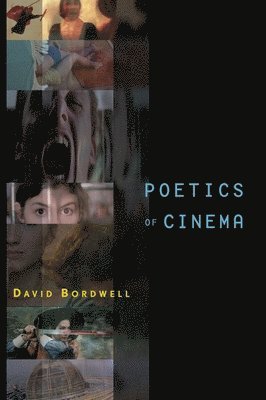
- Format
- Inbunden (Hardback)
- Språk
- Engelska
- Antal sidor
- 512
- Utgivningsdatum
- 2007-10-01
- Upplaga
- illustrated ed
- Förlag
- Routledge
- Illustratör/Fotograf
- Illustrations
- Illustrationer
- Illustrations
- Dimensioner
- 259 x 179 x 28 mm
- Vikt
- Antal komponenter
- 1
- Komponenter
- 68:B&W 7 x 10 in or 254 x 178 mm Case Laminate on White w/Gloss Lam
- ISBN
- 9780415977784
- 1022 g
Poetics of Cinema
- Skickas från oss inom 7-10 vardagar.
- Fri frakt över 249 kr för privatkunder i Sverige.
Passar bra ihop
De som köpt den här boken har ofta också köpt Who's Afraid of Gender? av Judith Butler (inbunden).
Köp båda 2 för 3040 krKundrecensioner
Fler böcker av David Bordwell
-
Film Art: An Introduction ISE
David Bordwell
-
Minding Movies
David Bordwell, Kristin Thompson
-
Narration in the Fiction Film
David Bordwell
-
ISE Film Art: An Introduction
David Bordwell
Recensioner i media
"It will come as no surprise to anyone already familiar with Bordwell that these essays exhibit a dazzling command of a wide range of filmmaking styles, fiom Japanese cinema of the Twenties through the Forties (two separate essays) to Hollywood's early usage of Cinemascope to the films of Taiwanese marrial-arts filmmaker King Hu."Film Comment "Film Theory, rightly or wrongly, makes most film makers cringe. We rarely see our processes, collaborations, technologies, obsessions, or underlying motivations thoughtfully examined in such writings. David Bordwell's work is radically different. Whether examining Hollywood cinema, Hong Kong, Independent, New Wave, silent or sound, high grossing or unknown, he addresses film with a clear mission -- to understand how a film works, how it's made and why -- and to discuss his findings in a direct style that embraces intellectuals and non-academic readers too. I have learned a great deal from David about film narrative, and in Poetics of Cinema, he carries his mission further, drawing on a lifetime's perspective to lay out some universal truths." James Mangold, Director of 3:10 to Yuma, Walk the Line, and Cop Land "Is there anyone who writes about the movies with more intelligence, clarity, and style than David Bordwell? With an awesome depth of knowledge, he conveys a deep love of his subject. In Poetics of Cinema Bordwell explains how movies can transcend, inspire, and become sublime. I feel when I read him that he starts where I leave off.." Roger Ebert "A new book by David Bordwell is always an important event and this one is especially welcome. These wide ranging essays are an oasis of grounded analysis in a desert of parched Theory and readers will drink deep from wells of insight about form, style and context and, above all, of love and appreciation for film." Larry Gross, Professor and Director, USC Annenberg School for Communication "Its title echoing Aristotle and the eponymous 1927 collection of essays by Russian Formalist scholars, Bordwells Poetics of Cinema reminds us that cinema is not just a cultural artifact or a market commodity, but is, first and foremost, an art form. If you wish to know what makes cinema different from any other art or wonder what it takes to be an expert on film, Bordwells book is the one to read." Yuri Tsivian, University of Chicago "David Bordwell's Poetics of Cinema is a must read collection of thirty years of Bordwell's engaging inquiry into, and analysis of, cinema from around the world. Bordwell is thorough, imaginative and, yes, in his own words often mirthful in his analysis of every topic he undertakes." Andrew Horton, University of Oklahoma, author of Writing the Character Centered Screenplay. "By turns suggestive and conclusive, playful and polemical, wide-ranging and to the point, Poetics of Cinema comingles the keen passion of a cinephile and the precision of a distinguished film scholar. David Bordwell's compellingly choreographed and painstakingly documented essays revisit, extend, and update the rich work of many decades." Eric Rentschler, Harvard University "David Bordwell's work on the poetics of cinema has been foundational for modern cinema studies, dedicated to an intense focus on the processes by which films make meaning and alert our senses. His combination of clarity and insight make him a master of the moving image, a scholar whose knowledge of the range of cinema remains unparalleled and a critic whose polemics are impossible to ignore." Tom Gunning, University of Chicago "This is a wonderfully rich and diverse collection of essays, covering a wide array of topics with David Bordwells characteristic rigour and verve. The collection spans just about the whole of Bordwells career, making available several important earlier essays; but because he has taken the
Övrig information
David Bordwell, Jacques Ledoux Professor at the University of Wisconsin, is arguably the most influential scholar of film in the United States. The author, with his wife Kristin Thompson, of the standard textbook Film Art and a series of influential studies of directors (Eisenstein, Ozu, Dreyer) as well as periods and styles (Hong Kong cinema, Classical Hollywood cinema, among others), he has also trained a generation of professors of cinema studies, extending his influence throughout the world. His books have been translated into fifteen languages.
Innehållsförteckning
Introduction; Part 1 Questions of Theory; Chapter 1 Poetics of Cinema; Chapter 2 Convention, Construction, and Cinematic Vision; Part 2 Studies in Narrative; Chapter 3 Three Dimensions of Film Narrative; Chapter 4 Cognition and Comprehension; Chapter 5 The Art Cinema as a Mode of Film Practice; Chapter 6 Film Futures; Chapter 7 Mutual Friends and Chronologies of Chance; Part 3 Studies in Style; Chapter 8 Cinecerity; Chapter 9 Taking Things to Extremes; Chapter 10 CinemaScope; Chapter 11 Who Blinked First?; Chapter 12 Visual Style in Japanese Cinema, 19251945; Chapter 13 A Cinema of Flourishes; Chapter 14 Aesthetics in Action; Chapter 15 Richness Through Imperfection;


